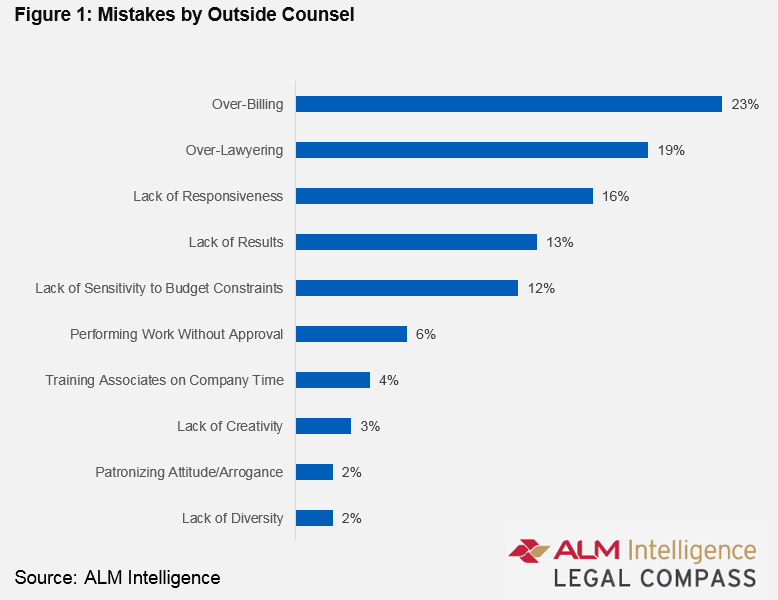The Billable Hour: Can Lawyers Learn from Consultants?
The legal industry now faces similar pressures from clients on billing models that the consulting industry previously confronted.
February 27, 2018 at 12:40 PM
5 minute read
Buyers of professional services and products are seeking more clarity, control and predictability in their relationship with providers. This pressure is present across all professional service sectors, opening the door for innovative firms to grab market share from those that are slow or resistant to change.
In the legal sector, a prime example of the need to keep up with evolving client expectations is the billable hour. Figure 1 shows the primary complaints inside counsel have when considering the services provided by external law firms. Over-billing, over-lawyering, lack of responsiveness and lack of results are at the top of the list. These complaints are connected to a lack of transparency in the client engagement process often present in the legal industry. This opaqueness – which largely can be attributed to the billable hour model (or more aptly, the “billable six minute increment”) is exacerbated by an attorney's need to meet a set number of hours each month, quarter and year. Corporate legal departments, as a consequence, are becoming less tolerant of firms that fail to maintain proper billing hygiene or explore alternative billing arrangements.
Client-Led Lessons from the Consulting Industry
In recent years, the consulting industry faced similar criticism of its historical time and materials (T&M) billing model. With the T&M model, project plans and milestone achievements drive the entire consulting engagement process, necessitating ongoing daily management. This rigid structure creates tension between the consulting provider and the client – with the provider pushing to increase its revenue potential by adding more resources to the engagement and the client pressing the provider to cap resources used.
According to a Big Four client I spoke with, “The time and materials billing model has its place, but is not a catchall. If the human material is really good, you usually need less time to get a great result and outcome. If it's not really good, why would you consider paying to educate the consultants on your dime and on the consultancy's clock?”
Fixed-Fees, Risk-Reward and Managed Services
In reaction to this, consulting firms are adapting how they structure services by moving away from the inflexible T&M model to new fee arrangements. In addition to fixed-fee arrangements, which have been around for a while, the risk-reward model – driven both by the consulting provider and client – has emerged and continues to gain traction in the consulting industry.
With risk-reward, there is more of a co-create mentality resulting in a focus on the outcome, not the exact details of how you get there. With this model, the provider places a portion of its fees at risk and is compensated based on the outcome, or success of the engagement. “Success” is predetermined with the client before the work begins. This model is gaining popularity as clients increasingly push for more accountability, flexibility and transparency from providers, in pursuit of a process driven by the desired results, not discrete steps. The risk-reward model is likewise beneficial to the consulting provider – it provides the opportunity to try out new approaches, co-create and take risks that have a high potential to lead to a big reward.
The managed services consulting model is also gaining traction. This model adds client value through ongoing service delivery, rather than the traditional approach of discrete, intensive projects with a clearly defined start and end. There is some upfront investment, and then less investment as time goes on with the revenue becoming steady like any other subscription service. This billing arrangement, in turn, increases the likelihood of growing profits as resources are not added over time.
Lessons for Legal
Clients have reacted positively to these newer models, with one noting that “it smoothed out cash burn and gave increased incentive for the consultancy to get tangible results quicker if they wished to be paid.”
These newer billing and delivery models relieve some of the client-provider tension, allowing consulting firms to be more creative in the solutions they provide. Moreover, they permit consulting firms to finally break out of the linear scaling challenge that has always plagued the industry – a problem also experienced by law firms.
Although the consulting sector's evolution is not a direct copy-paste to solve the pressures in the legal industry, there are parallels. In addition to wanting more transparency and involvement in the relationship, as indicated in the survey results above, law departments are also pushing for alternatives to the traditional billable hour. As illustrated in Figure 2, 75 percent of alternative fee arrangements or negotiated fees originate from legal departments, not law firms.
By clinging to the traditional billable hour model of service delivery, law firms are setting the stage to not only experience higher tensions with the clients over costs but also lose business to newer entrants to the legal services sector. As progressive firms and technology providers embrace modern approaches to client service and billing, firms that are slow to adapt will likely cede market share to these more agile competitors.
This content has been archived. It is available through our partners, LexisNexis® and Bloomberg Law.
To view this content, please continue to their sites.
Not a Lexis Subscriber?
Subscribe Now
Not a Bloomberg Law Subscriber?
Subscribe Now
NOT FOR REPRINT
© 2025 ALM Global, LLC, All Rights Reserved. Request academic re-use from www.copyright.com. All other uses, submit a request to [email protected]. For more information visit Asset & Logo Licensing.
You Might Like
View All

Rates Will Go Up (Again), But Here's Why Profitability Might Not Be Maximized
4 minute read
'Utterly Bewildering': GCs Struggle to Grasp Scattershot Nature of Law Firm Rate Hikes
Trending Stories
- 1'A Waste of Your Time': Practice Tips From Judges in the Oakland Federal Courthouse
- 2Judge Extends Tom Girardi's Time in Prison Medical Facility to Feb. 20
- 3Supreme Court Denies Trump's Request to Pause Pending Environmental Cases
- 4‘Blitzkrieg of Lawlessness’: Environmental Lawyers Decry EPA Spending Freeze
- 5Litera Acquires Workflow Management Provider Peppermint Technology
Who Got The Work
J. Brugh Lower of Gibbons has entered an appearance for industrial equipment supplier Devco Corporation in a pending trademark infringement lawsuit. The suit, accusing the defendant of selling knock-off Graco products, was filed Dec. 18 in New Jersey District Court by Rivkin Radler on behalf of Graco Inc. and Graco Minnesota. The case, assigned to U.S. District Judge Zahid N. Quraishi, is 3:24-cv-11294, Graco Inc. et al v. Devco Corporation.
Who Got The Work
Rebecca Maller-Stein and Kent A. Yalowitz of Arnold & Porter Kaye Scholer have entered their appearances for Hanaco Venture Capital and its executives, Lior Prosor and David Frankel, in a pending securities lawsuit. The action, filed on Dec. 24 in New York Southern District Court by Zell, Aron & Co. on behalf of Goldeneye Advisors, accuses the defendants of negligently and fraudulently managing the plaintiff's $1 million investment. The case, assigned to U.S. District Judge Vernon S. Broderick, is 1:24-cv-09918, Goldeneye Advisors, LLC v. Hanaco Venture Capital, Ltd. et al.
Who Got The Work
Attorneys from A&O Shearman has stepped in as defense counsel for Toronto-Dominion Bank and other defendants in a pending securities class action. The suit, filed Dec. 11 in New York Southern District Court by Bleichmar Fonti & Auld, accuses the defendants of concealing the bank's 'pervasive' deficiencies in regards to its compliance with the Bank Secrecy Act and the quality of its anti-money laundering controls. The case, assigned to U.S. District Judge Arun Subramanian, is 1:24-cv-09445, Gonzalez v. The Toronto-Dominion Bank et al.
Who Got The Work
Crown Castle International, a Pennsylvania company providing shared communications infrastructure, has turned to Luke D. Wolf of Gordon Rees Scully Mansukhani to fend off a pending breach-of-contract lawsuit. The court action, filed Nov. 25 in Michigan Eastern District Court by Hooper Hathaway PC on behalf of The Town Residences LLC, accuses Crown Castle of failing to transfer approximately $30,000 in utility payments from T-Mobile in breach of a roof-top lease and assignment agreement. The case, assigned to U.S. District Judge Susan K. Declercq, is 2:24-cv-13131, The Town Residences LLC v. T-Mobile US, Inc. et al.
Who Got The Work
Wilfred P. Coronato and Daniel M. Schwartz of McCarter & English have stepped in as defense counsel to Electrolux Home Products Inc. in a pending product liability lawsuit. The court action, filed Nov. 26 in New York Eastern District Court by Poulos Lopiccolo PC and Nagel Rice LLP on behalf of David Stern, alleges that the defendant's refrigerators’ drawers and shelving repeatedly break and fall apart within months after purchase. The case, assigned to U.S. District Judge Joan M. Azrack, is 2:24-cv-08204, Stern v. Electrolux Home Products, Inc.
Featured Firms
Law Offices of Gary Martin Hays & Associates, P.C.
(470) 294-1674
Law Offices of Mark E. Salomone
(857) 444-6468
Smith & Hassler
(713) 739-1250











